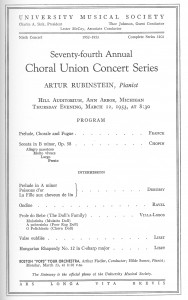UMS Director of Programming Picks Five Notable UMS Debuts
One of the reasons we’re so excited about our 2015-2016 season is the debut performances. Winter is especially ripe with UMS debuts, including by mezzo-soprano Jamie Barton, pianist Igor Levit, vocalist Tanya Tagaq, among many others.
Debuts are an important part of our 135-year-history. Every artist debut has embedded in it that same kind of hope and optimism, something truly great might come of all this talent which is being revealed to us for the first time. At UMS, every debut also holds the possibility of a life-long relationship between that artist and our community of music lovers.
Here are five notable debuts which grew into a fully formed career and lifetime of memories for UMS audiences:
Violinist Yehudi Menhuhin – UMS debut, 1932
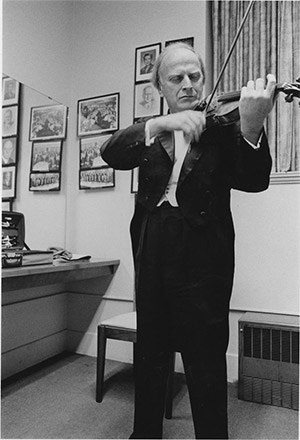 Photo: Yehudi Menuhin readies for the 1974 UMS May Festival (UMS Archives).
Photo: Yehudi Menuhin readies for the 1974 UMS May Festival (UMS Archives).
Menuhin made his concert debut at UMS when he was age sixteen. He went on to give eighteen UMS concerts over the course of his career most often as violin soloist but also as a conductor later in his life. His last appearance was in February of 1987 fifty-five years after his debut.
Pianist Artur Rubinstein – UMS debut, 1938
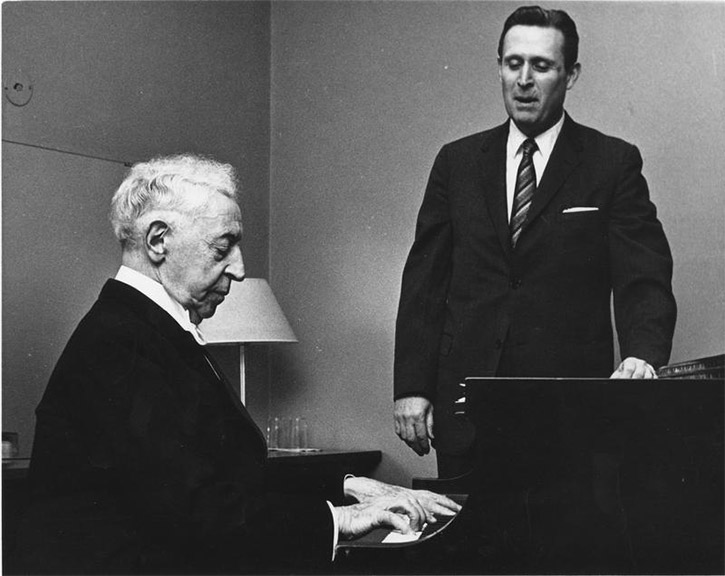
Photo: Pianist Arthur Rubinstein and former UMS president Gail Rector (UMS Archives).
The great Polish pianist Artur Rubinstein didn’t make his UMS debut until he was 51. He played Tchaikovsky’s First Piano Concerto with the Philadelphia Orchestra at May Festival. Even though he was middle aged when he first come to Ann Arbor, he still managed to give fifteen concerts for UMS over the course of his career, the last one, a benefit recital in January 1971.
Soprano Leontyne Price – UMS debut, 1957
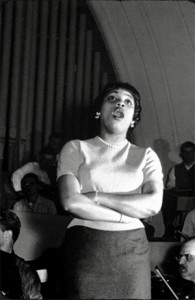
Photo: Leontyne Price sings her first career Aida in concert version with the Philadelphia Orchestra at the May Festival (UMS Archives).
Price had a double debut when she first come to UMS for the May Festival in 1957. Not only was it her first performance in Ann Arbor, but it was also her first public performance of the title role of Aida, a character she went on to own and dominate in every important opera house in the world. By the time she gave her last UMS recital in 1991, she had visited Ann Arbor to perform eight times.
Mezzo-soprano Cecilia Bartoli – UMS debut, 1993
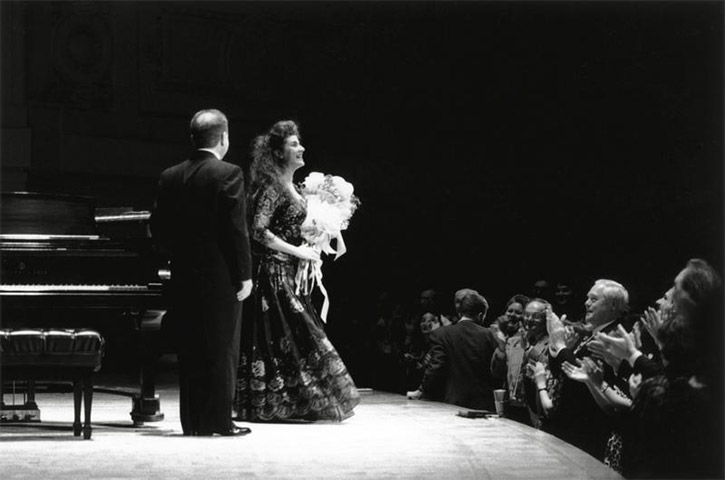
Photo: Mezzo-soprano Cecilia Bartoli and pianist Martin Katz receive a standing ovation at her UMS debut, April 10, 1993 (UMS Archives).
Bartoli gave her debut recital performance in Hill Auditorium when she was relatively unknown. She was partnered by Ann Arbor’s very-own pianist Martin Katz. Her most recent appearance was in February of 2004 with the Orchestra of the Age of Enlightenment in a program devoted to the music of Antonio Salieri.
Trumpeter Wynton Marsalis – UMS debut, 1996
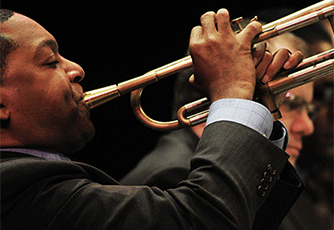
Photo: Trumpet Wynton Marsalis will receive the UMS Distinguished Artist Award as part of this season’s Ford Honors Program on March 30, 2014 (Photo courtesy of the artist).
The great jazz (and classical) trumpet virtuoso Wynton Marsalis gave his first UMS concert with his Lincoln Center Jazz Orchestra Octet in 1996. Since that time he has become an almost annual fixture on the UMS season while, simultaneously, becoming a singular international voice for the centrality of jazz to American culture.
Do you have your own notable debuts or early performance favorites in UMS history? Share them in the comments below.
This Day in UMS History: Artur Rubinstein (March 12, 1953)
March 12, 1953
Hill Auditorium
Artur Rubinstein, pianist
There are a few musicians with whom I’d love to sit down and have a conversation. Bach, certainly, to ask him how he wrote such incredible counterpoint. Mozart, just to joke around with (although I also have a bone to pick with one of his doublings in the last movement of the D major K. 499 string quartet). Some I’d just be content to hear play: Paganini, for instance, or Joseph Joachim. Rubinstein fits into both categories: by all accounts his playing was arresting (certainly the recordings I’ve heard are), and, judging by his memoirs My Young Years, quite an entertaining companion as well.
The Arthur Rubinstein International Music Society has this to say about Rubinstein:
“Arthur Rubinstein represented in both his life and his music-making a unique joie de vivre. That alone would set him apart in this serious musical age, where there is a high degree of skill but very little charm or poetry. Arthur Rubinstein was able to communicate joy in his playing. He loved the piano, he loved the music he played, and he was always able to charm audiences all over the world with one of the most extraordinary personalities that this century has seen.
In his long life he saw interpretation pass from Romanticism to the percussionism of Bartók and Prokofiev, and then to the literalism brought in by the anti-Romantic movement, in which young pianists were trained to observe only the printed note, keeping themselves out of music. Rubinstein did not like what he heard. He realized, as all great artists do, that music means nothing until brought to life by an imaginative, sympathetic player. He knew that it was the function of the interpreter to refract the message of the composer through the prism of his own mind. Otherwise a robot could do the job as well.
Perhaps the example of his own life, and of the many great recordings he left, will spur young artists…to be their own masters, to realize that there is more to music than merely playing the notes correctly, to make music with a big mind and a big conception that not only reproduces the notes but also transcends them.”
I highly recommend reading their entire bio of Rubinstein.
Here’s the program from 1953:
Franck: Prelude, Chorale and Fugue
Chopin: Sonata in b minor, Op. 58
Debussy: Prelude in a minor; Poissons d’or; La Fille aux cheveux de lin
Ravel: Ondine
Villa-Lobos: Prole do Bebe (The Doll’s Family)
Liszt: Valse oubliée
Liszt: Hungarian Rhapsody No. 12 in C-sharp minor
“This day in UMS History” is an occasional series of vignettes drawn from UMS’s historical archive. If you have a personal story or particular memory from attending the performance featured here, we’d love to hear from you in the comments.


